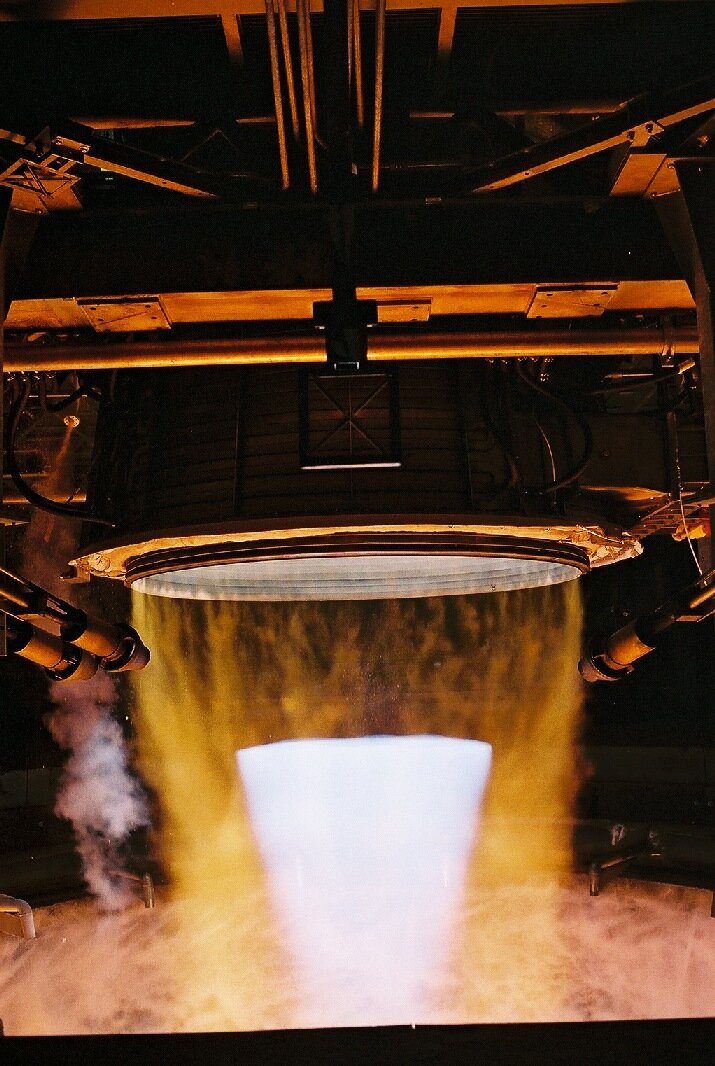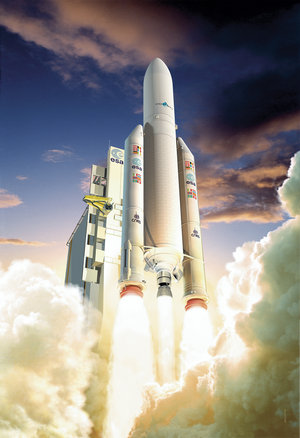Ariane 5 ECA
| Ariane 5 ECA | |
|---|---|
| Height | up to 53 m |
| Diameter | up to 5.4 m |
| Liftoff mass for a double launch | 780 tonnes |
| Payload mass into geostationary transfer orbit (GTO) | 10 tonnes |
A version of the Ariane 5 launcher, Ariane 5 ECA, was designed to place payloads weighing up to 9.6 tonnes into GTO. With its increased capacity, Ariane 5 ECA could handle dual launches of very large satellites.
This version of the Ariane 5 helped to maintain Europe’s competitiveness in the commercial space transport sector by offering customers the opportunity to launch a wider range of heavier satellites while reducing launcher production costs.
Ariane 5 ECA: new elements
Ariane 5 ECA was an improved Ariane 5 Generic launcher. Although it had the same general architecture, a number of major changes were made to the basic structure of the Ariane 5 Generic version to increase thrust and enable it to carry heavier payloads into orbit.
Solid boosters (EAP)
The EAP boosters’ upper segment of the Ariane 5 ECA (also known as segment S1) carried 10% (2.5 tonnes) more propellant. This extra propellant gave the Ariane 5 ECA an additional 50 tonnes of thrust in the first 20 seconds following liftoff. Together the twin boosters delivered a thrust of 1300 tonnes at liftoff, nearly 10 times the level delivered by the engine of the central stage.
The boosters were also equipped with a nozzle that had fewer parts and was easier and cheaper to produce.
Main stage (EPC and Vulcain 2 engine)

An improved version of the Vulcain engine was developed and used on the Ariane 5 ECA version. The Vulcain cryogenic engine was modified to increase its thrust by 20%, up to 137 tonnes. This Vulcain 2 operated under slightly higher pressure with a mixture ratio that had 20% more liquid oxygen than the Vulcain 1. Because of this change in the mixture, a new oxygen turbopump was developed.
In addition, the Vulcain 2 turbopump exhausts were reinjected into the main system, thus improving engine performance at high altitude. The Vulcain 2 engine was a key contributor to the additional lift capability of the new Ariane 5 ECA version into GTO.
To hold the extra liquid oxygen needed for the EPC core stage, the capacity of the liquid oxygen tank was increased by 16 tonnes. This was achieved by relocating the common tank bulkhead between the liquid oxygen tank and the liquid hydrogen tank of the Ariane 5 Generic EPC stage and reinforcing the structure elements.
The fuel load capacity of the EPC was:
- Liquid oxygen: 150 tonnes
- Liquid hydrogen: 25 tonnes
The EPC stage operated for nearly 540 seconds. It also performed the roll control function during all its propulsion phase. At shut down, at an altitude between 160 km and 210 km depending on the mission’s trajectory, the EPC stage separated from the upper composite and reentered the atmosphere above the Atlantic Ocean.
Upper stage
The Cryogenic upper stage (ESC-A) A new more powerful cryogenic upper stage was developed for the Ariane 5 ECA launcher configuration. It was referred to as the ESC-A stage from its title in French, Etage Supérieur Cryotechnique de type A.
The ESC-A stage reused the reliable HM-7B rocket engine implemented on the third stage of the Ariane 4 launcher. Its mission is to provide the complementary energy necessary to reach the target orbits. The stage also provided roll control during the propulsion phase and during the separation sequences of the payloads.
The ESC-A stage was composed of:
- two cryogenic tanks (one for liquid hydrogen, the other for liquid oxygen) containing 14.7 tonnes of ergols
- the HM7B engine which operates for nearly 940 s and delivered a thrust in vacuum of 6.5 tonnes
Vehicle Equipment Bay C (VEB-C)
Modifications were also introduced on the Vehicle Equipment Bay (VEB) used for the Ariane 5 Generic version.
The new VEB was adapted to the A5 ECA configuration:
- it operated in a “cryogenic” environment
- it did not support the EPS stage in its middle volume anymore
- it no longer needed to carry the attitude control system (SCA) as that function was provided by the ESC-A stage itself
- it was made, as before, in composite material, but was smaller and lighter
- it reused the electrical equipments of the Ariane 5 Generic Plus version
A conical adaptor structure was developed and mounted on top of the VEB-C structure to provide at its upper interface the Ariane standard diameter of 2624 mm where the payload adaptor was fixed.
Changes at Europe’s Spaceport
To accommodate this larger version of the Ariane 5 several changes were made to the equipment and facilities at Europe's Spaceport. For instance, the new upper stage of the Ariane 5 ECA made the launcher taller so the roof of the Ariane 5 Final Assembly Building was raised by more than four metres.
The launch tower was also been adapted to fit the height of the new launcher and the arms that carried the propellant feed lines and electrical connections to the launcher's new upper stage.






